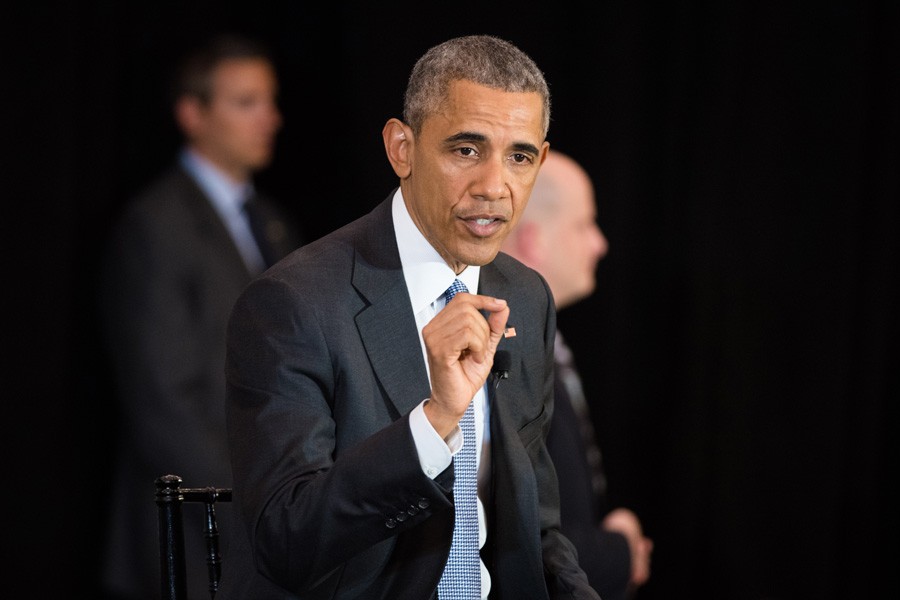Obama continues push for his Supreme Court pick in talk at University of Chicago
Daniel Tian/Daily Senior Staffer
President Barack Obama speaks at the University of Chicago on Thursday. The president argued for Senate Republicans to hold a hearing for Judge Merrick Garland, his pick to replace Justice Antonin Scalia on the Supreme Court.
April 8, 2016
CHICAGO — President Barack Obama focused on his struggles with the Supreme Court nomination process, polarization in electoral politics and the importance of increasing diversity in public office during his talk at the University of Chicago on Thursday afternoon.
Obama, who previously taught constitutional law at University of Chicago Law School, returned for the first time since becoming president. During his talk to audience of about 250 law students and faculty, he made the case for Senate Republicans to hold a hearing for Judge Merrick Garland, his pick to replace Justice Antonin Scalia on the Supreme Court. He emphasized that the judicial branch should exist outside of the political partisanship found in elected offices, and that Republicans politicizing the issue “erodes the institutional integrity of the judicial branch.”
“If you start getting into a situation in which the process of appointing judges is so broken, so partisan, that an eminently qualified jurist can’t even get a hearing, then we are going to see the kinds of sharp partisan polarization that have come to characterize our electoral politics, seeping entirely into the judicial system,” Obama said.
The president said Garland — who was born in Chicago, grew up in Lincolnwood and attended Niles West High School in Skokie — is an ideal candidate for the nomination because he is respected by both parties and is extremely qualified.
Although Garland is a candidate that neither party would find objectionable, he does not advance the goal of bringing more people with marginalized identities to the judicial branch, Obama said after being questioned by a student about the role of diversity in his nomination. However, he said that while he has a history of working to increase diversity across all levels of federal court, he would never set out with the goal to nominate someone from any specific minority group for any office.
“At no point did I say, ‘Oh, I need a black lesbian from Skokie in that slot. Can you find me one?’” Obama said. “Yeah he’s a white guy, but he’s a really outstanding jurist. Sorry.”
Although Garland may not make the Supreme Court more diverse, his history as a centrist judge makes him deserving of both a hearing and a fair vote from Republicans, Obama said.
Sen. Dick Durbin (D-Ill.), who attended the event, said the unwillingness of Congress Republicans to even hear Garland shows the nominee is an electable choice for the office.
“What’s interesting to me is the refusal to have any hearings,” Durbin told the Daily. “What it says to me is that there’s a fear that if they have hearings, it will be hard to not give the nominee a vote and perhaps seat them. It’s an unusual strategy because it’s saying we’re not even going to have a hearing because we might be forced to vote for him.”
Sen. Mark Kirk (R-Ill.) was the first Republican to meet with Garland on March 29.
Along with criticism for the reasoning behind denying Garland a hearing, Rep. Bill Foster (D-Ill.) pointed out that not appointing a judge is causing a halt in the Supreme Court’s ability to adjudicate — the Court had its first 4-4 decision March 29 in a case on union rights following Scalia’s death.
“The Constitution is clear on this issue — it’s time for the Senate to do its job for the good of our nation’s judiciary and the American People,” Foster said after the event. “The Court is too important to leave it short a Justice because of partisan politics.”
Email: [email protected]
Twitter: @robinlopsahl


